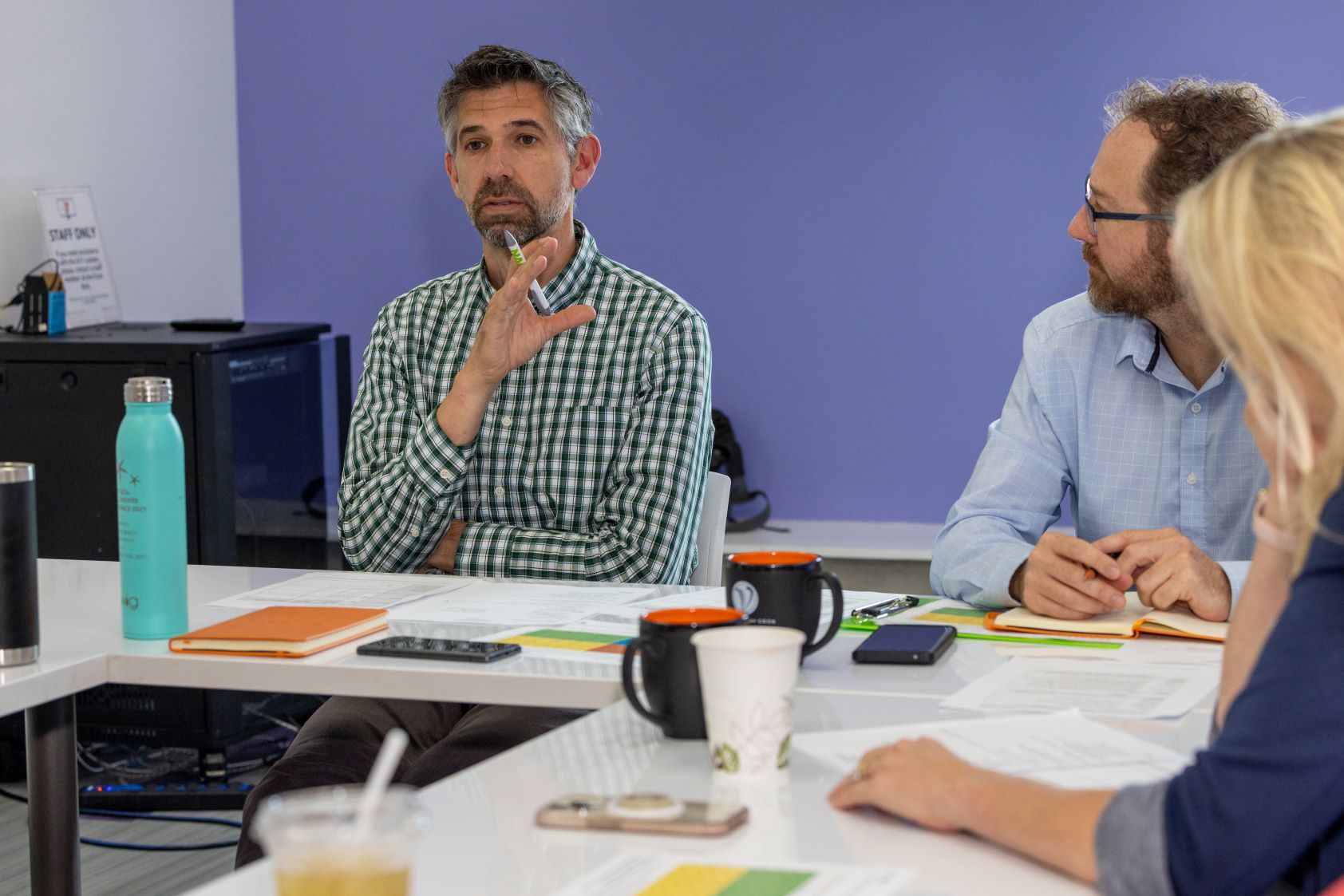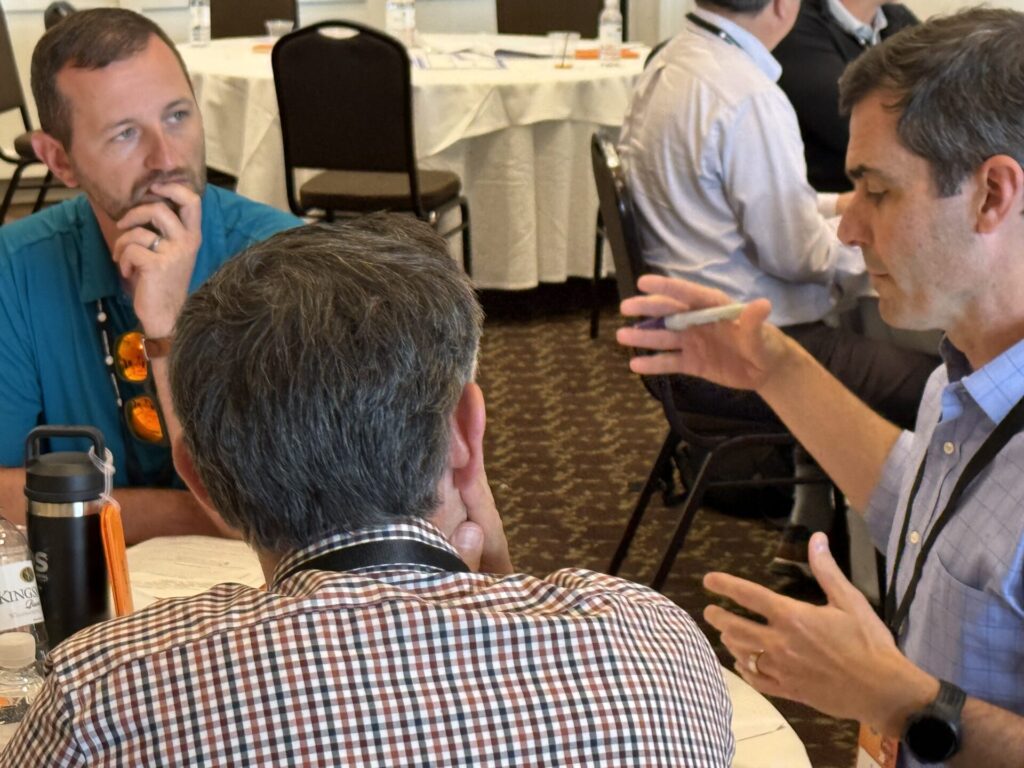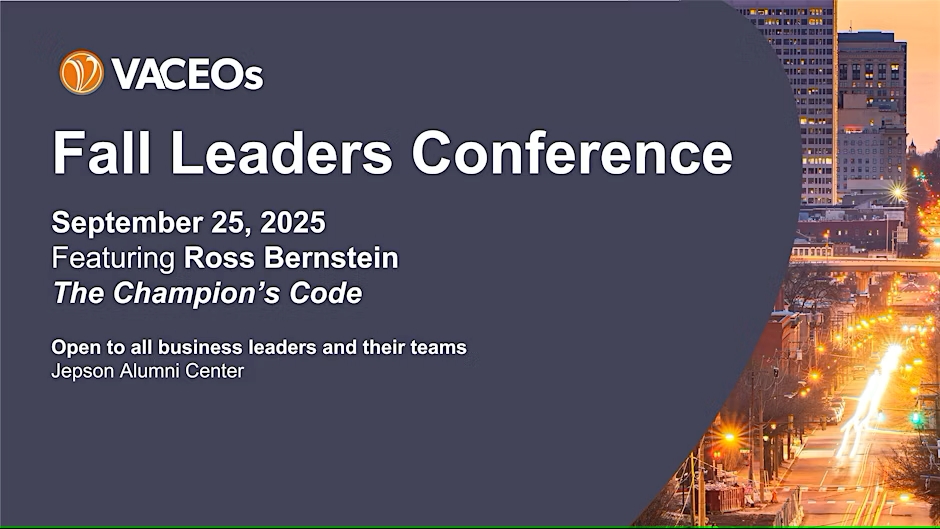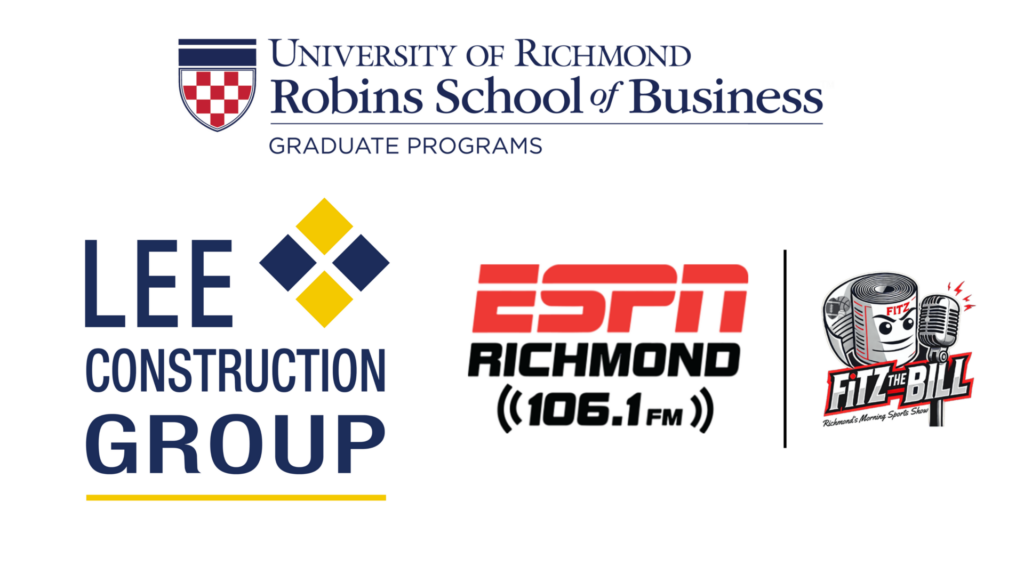What We’re Reading This Summer

When I confessed on LinkedIn that I don’t read business books cover to cover anymore, I didn’t expect the flood of thoughtful replies from leaders across our network. Turns out, I’m not alone!
From audiobooks, to ChatGPT summaries, to the occasional deep dive, leaders in the VACEOs network are reading differently—and often, reading far beyond traditional business topics.
So what are we reading this summer? Here’s what I heard.
Business & Leadership Books (That Actually Deliver)
- Reset by Dan Heath
Recommended by Sarah Milston, who also endorsed:- Who Better Than You and Dreaming Big by Will Packer
- Unreasonable Hospitality by Will Guidara
- The AI-Driven Leader by Geoff Woods
Brittany Toler urges a full read, saying it’s one of the few worth going beyond a summary—ideal for leaders who want to “think forward.” - The Great Game of Business by Jack Stack
Peter Norman calls this “a master class in open-book management” that turns KPIs into a team sport. - The Next Conversation by Jefferson Fisher
Peter Norman also praised this one for its practical insights on navigating tough conversations. Kristin Harrison recommended Fisher’s Instagram. - 10X is Easier Than 2X by Dan Sullivan
Mentioned by Christopher Jones, this is a popular pick this year for those scaling ambitiously. - Slow Productivity by Cal Newport & Hidden Potential by Adam Grant
Aaron Lee found both of these worth a deep dive. - Good to Great and Traction
Bryan Sklar shared that these two books have had the most impact on his business. - The Heart of Business by Hubert Joly
Henry Clifford recommended this, as well as the others below, but only on Audible.
Not Reading—Listening or Summarizing
- Henry Clifford listens exclusively via Audible, saying “No Audible, no book.” His 2025 listens include:
- Demon Copperhead by Barbara Kingsolver
- Let My People Go Surfing by Yvon Chouinard
- Todd Mawyer and others are using ChatGPT and Blinkist to quickly extract business book insights.
- Beth Jacobs adds: “Blinkist dives a little deeper than ChatGPT and still lets you skip around.”
Fiction, Essays & The Inner Life
Many leaders are choosing novels, cultural commentary, and poetry over business books. The humanities for leaders of humans, right?
- James Burke put it plainly: “Novels, plays, literature about humanity… all the lessons are there.”
- Chauncey Jenkins recommended In Praise of Shadows by Junichiro Tanizaki, calling it “a masterclass in vision and identity” that challenges Western modernism.
- Bryant Harrison shared a wide-ranging list, including
- The Art of Gathering by Priya Parker
- Anam Cara and The Inner Landscape by John O’Donohue
- I Will Teach You to Be Rich by Ramit Sethi
- Nicole Mason is inspired by God Is At Work, by Ken Eldred, who built numerous businesses.
- Kim Moss reads a ton of fiction and recommends Remarkably Bright Creatures, by Shelby Van Pelt and Tomorrow, Tomorrow and Tomorrow, by Gabrielle Zevin.
- Laurie Head is reading A Virginia Odyssey: Culture, Community, and Trust by John Thomas.
I Read . . . But
A few final takeaways from the comments:
- Keith Hartman compared most business books to “modern medicine shows”—formulaic and better served in outline form.
- Nick Serfass said – Couldn’t agree more! I’m interested in stories, not lists, steps, or sound bytes.
- Jennifer Tompkins shared a great list of book summary tools at ISBNDB.com.
- Rick Whittington uses ChatGPT to generate summaries and then listens to them podcast-style.
- David Wren and Kelly All find more value in history, fiction, and narrative storytelling than step-by-step business advice.
Your Summer Reading Strategy
Whether you’re lounging at the river or knocking out chapters between meetings, here’s a winning approach:
- Pick one business book to skim deeply or summarize.
- Add one novel, memoir, or cultural essay for balance.
- Try an audiobook on your next drive or walk.
- Use AI summaries to preview before committing.
It turns out, you’re not alone if you can’t finish another 300-page book about habits or frameworks. This summer, read what gives you energy, broadens your perspective, and—if you’re lucky—actually entertains you.
What’s on your summer reading list? Let’s keep the conversation going.
VACEOs Executive Director Scot McRoberts used ChatGPT to summarize comments from his Linkedin post and elsewhere for this blog post.
Collaboration Over Competition: How Businesses Can Amplify Impact Through Purpose-Driven Partnerships

Contributed by Theresa Ceniccola (COO) and Susie Fife (CEO) of Red Orange Studio
Most business leaders are constantly looking for ways to stay one step ahead of the competition. But what if the greatest opportunity for growth isn’t in outpacing others—but in aligning with them?
At Red Orange Studio, we’ve seen firsthand how collaboration over competition can unlock meaningful change. Through our annual PIP (People Inspiring People) Nonprofit Award, we’ve experienced the power of uniting businesses—even those in the same industry—for a shared mission. And the impact has been extraordinary.
The Power of Purpose-Driven Collaboration
Now in its eighth year, the PIP Award provides pro bono branding and marketing services to a deserving nonprofit. But it’s not just a Red Orange initiative. It’s a collaborative effort between several marketing agencies in Richmond and Virginia Beach that closely align with our values. Our PIP Partners include:
Workshop Digital
Brand Federation
CURE
Feedback
Good Run Research & Recreation
Mix + Shine Marketing
Lewis Media Partners
Parkwood Creative
Rian/Hunter Production
Many of our PIP Partner CEOs are VACEOs members, which shows in the way they lead in this level of community impact. Collectively, we donate time, talent, and tools to a nonprofit that wouldn’t otherwise have access to this level of support. It’s a full-scale marketing transformation, powered by collaboration and purpose.
Why It Works (and Why It Matters to Business Leaders)
VACEOs is the perfect example of how leaders can grow together. When we collaborate across industries—or even across perceived competition lines—the results are amplified. And we all gain more than goodwill. We gain:
– Stronger relationships with partners who can support future business goals
– Increased brand visibility as leaders who stands for more than profit
– Deeper team engagement around meaningful work
– Wider community impact with lasting ripple effects
And in times of economic uncertainty, collaboration helps stretch limited resources while boosting innovation.
A Framework for Collaborative Impact
If you’re curious about launching a collaborative effort in your own industry or community, here’s the framework we use to guide our partnerships:
1. Clarity – Align on the “why.” Define the mission before you define the scope.
2. Complement – Choose partners whose strengths differ from your own but whose values align with your company.
3. Communication – Set clear expectations, roles, and responsibilities.
4. Consistency – Treat pro bono work with the same level of professionalism as any other project, defining scope, timeline and quality to build trust and deliver impact.
5. Celebration – take the time to acknowledge every contribution and share the stories of success along the way.
Be the Catalyst
Every collaborative movement needs a spark—and leaders are uniquely positioned to be that catalyst for visionary initiatives. You don’t have to wait for the perfect opportunity or a formal coalition to begin. You can start with a simple idea and a generous invitation.
In our experience, many businesses want to contribute to community-focused partnerships, but they lack the time, resources, or internal capacity to organize something from scratch. By stepping up as the initiator, you remove that barrier—and create space for others to show up and make a difference.
And here’s the truth: leaders who take the first step often become the go-to voice in their industry. You’ll be recognized not only for your values but for your ability to bring people together. It positions your business as a thought leader, a connector, and a community builder—the kind of brand others want to follow, support, and work with.
So ask yourself:
– What community issue do I care deeply about?
– Who are the partners I admire and would love to work alongside?
– What’s one small way we could collaborate for good?
Then make the first call. Send the first email. Share the first idea.
Because when you make it easy for others to say yes, you set the tone for something bigger than business. You extend a generous invitation to be a part of something even bigger.
Let’s redefine what success looks like—not just by how far we go, but by how many we bring with us.
“Alone we can do so little; together we can do so much.” – Helen Keller
When Should I Join a CEO Peer Group?

8900 CEOs.
Over the last 25 years, I believe I have met, spoken with, texted, or emailed approximately 8,900 CEOs. More than 1200 of them joined VACEOs and have participated in a peer roundtable or forum.
Not once—ever—has a member said, “Boy, I sure am glad I waited to join you!”
However, many times I have heard a CEO say, “I really wish I had done this sooner.”
So, what’s the best time for you to join a roundtable? The short answer: Now.
Of course, you need to be determined to commit to your roundtable peers with your presence at every meeting, and with your full-on participation at those meetings.
Don’t have time, you say? You never will. No one has time.
CEOs who join a peer group grow their businesses faster, become better leaders, and have more time for family – and for life beyond work.
Scot McRoberts helped found VA Council of CEOs in 2000, and has been its Executive Director since then.
The Value of Vulnerability

Contributed by Stephanie Ford, Director, Warren Whitney
Vulnerability. It’s a word that can evoke discomfort, particularly in professional settings. Yet, when approached with intentionality, vulnerability can be the cornerstone of authentic leadership and a catalyst for fostering trust, creativity, and resilience in the workplace.
Do you remember Jerry Seinfeld’s observation that at a funeral, most people would rather be in the coffin than deliver the eulogy? As humorous as it is, that quip reveals a deeper truth: being vulnerable, whether in public speaking or expressing emotions, can feel daunting. But why?
The Challenge of Vulnerability
Being vulnerable often feels like exposing weaknesses or risking judgment. In the workplace, where professionalism and competence are paramount, the stakes can seem even higher. Yet, this hesitation overlooks a critical fact: vulnerability isn’t about weakness; it’s about courage.
To be vulnerable is to share honestly, to seek feedback, and to own mistakes—all actions that require immense bravery. It challenges us to step outside our comfort zones, confront fears, and risk rejection. But in doing so, we create space for connection, growth, and innovation.
Being vulnerable in the workplace can look different depending on the leader’s personality and industry. What might work well in a technology corporate office setting is likely different than what works well in a manufacturing or warehouse worker setting. In all cases, know your audience and consider the environment.
Vulnerability and Leadership
What does vulnerability have to do with leadership? Everything.
Authentic leadership thrives on transparency and trust—qualities that vulnerability cultivates. Consider the story of a Richmond-based CEO and Chairman. Faced with a pivotal moment in his leadership journey, he invited his executive team to share unfiltered feedback on his performance. Sitting in the center of the room, open to critique, he began a transformative journey to evolve his leadership style.
His willingness to embrace vulnerability not only strengthened his leadership—it reshaped his organization’s culture, driving retention and revenue growth. His example underscores that vulnerability is not just a personal development tool but a strategic asset.
The Workplace Impact
Research supports the power of vulnerability. A study highlighted in a Hidden Brain podcast examined workplace safety and found that cultures where mistakes were openly acknowledged—not punished—fostered greater trust, lower turnover, and higher satisfaction. Conversely, organizations where employees feared admitting errors cultivated anxiety and inefficiency.
A culture that embraces vulnerability encourages learning from failure, an essential ingredient for innovation. By reframing mistakes as opportunities for growth, leaders can inspire resilience and creativity within their teams.
Rewriting the Narrative
Often, our resistance to vulnerability stems from the stories we tell ourselves—narratives that shape our perceptions and limit our potential. For example, we might view past failures as personal shortcomings rather than stepping stones to success. By reframing these stories, we can transform our self-perception and unlock new possibilities.
Reflect on a past failure. What lessons emerged from that experience? How did it shape your growth or perspective? These reflections reveal the rewards of vulnerability: resilience, innovation, and connection.
Traits of Authentic Leadership
At its core, vulnerability aligns with the hallmarks of authentic leadership:
- Self-awareness: Understanding and accepting your strengths and areas for growth.
- Transparency: Fostering open and honest communication.
- Values alignment: Leading with principles that resonate personally and professionally.
- Servant leadership: Prioritizing the needs of others to create an environment where everyone thrives.
Steps to Embrace Vulnerability
So, how can you begin integrating vulnerability into your leadership and workplace culture? Here are practical steps to guide the way:
Show humanity: Share personal experiences, admit mistakes, and be open about challenges. Authenticity fosters trust.
Practice empathy: Treat others with compassion and consideration, especially during difficult conversations.
Reframe setbacks: View failures as opportunities to learn and innovate. Lead by example in embracing this mindset.
Create safe spaces: Encourage open dialogue where team members feel comfortable sharing ideas and concerns without fear of judgment.
The Rewards of Vulnerability
Vulnerability builds trust, strengthens relationships, and enhances collaboration. It transforms workplaces into environments where employees feel valued, empowered, and connected.
As English author Neil Gaiman once said, “The moment that you feel you are walking down the street naked, that’s the moment that you may be starting to get it right.” Vulnerability, though uncomfortable, is a powerful force for change.
Moving Forward
To harness the benefits of vulnerability, reflect on your leadership style and organizational culture. What steps can you take to foster authenticity within your team? What barriers must you overcome to embrace this approach?
Remember, vulnerability is a journey, not a destination. Start small, acknowledge the challenges, and commit to consistent practice. The results—stronger connections, deeper trust, and greater innovation—are well worth the effort.
Go forth, and lead with vulnerability!
Fall Leaders Conference 2025

The Fall Leaders Conference is open to all leaders, not just VACEOs members.
Join VACEOs on September 25, 2025, at the Jepson Alumni Center to spend the afternoon with Ross Bernstein.
Are you ready to inspire your team, sharpen your leadership edge, and connect with fellow business leaders who are striving for greatness? Don’t miss the VACEOs Fall Leaders Conference — a high-impact event open to business owners, C-suite executives, and their teams.
This year’s conference features an electrifying keynote from internationally acclaimed speaker and best-selling author Ross Bernstein. With over 50 books to his name and appearances on CNN, ESPN, Fox News, and “CBS This Morning,” Ross brings a powerful and practical message about what it truly takes to win — in sports, in business, and in life.
🎤 Keynote Highlight: Ross Bernstein
“The Champion’s Code: Building Relationships Through Life Lessons of Integrity and Accountability from the Sports World to the Business World”
Ross has spent years interviewing over 1,000 professional athletes and coaches who were all part of championship teams. His research uncovers the common traits that separate good teams from great ones — and shows how those same principles apply to building elite business cultures.
In this high-energy, visually engaging session, Ross will share:
- What makes champions in sports — and how to replicate that mindset in your business
- How servant leadership and a strong moral compass drive sustained success
- The role of integrity, ethics, and “doing things the right way” in building lasting relationships
- Practical strategies to build a culture of excellence and become a trusted partner to your clients
- How to turn disruption into opportunity and create momentum in your organization
Whether you’re a founder, executive, or rising leader, this session will leave you energized and equipped with real-world insights you can immediately put into practice.
💼 Who Should Attend?
This conference is designed for:
- CEOs, business owners, and entrepreneurs
- Senior leaders and executive teams
- High-potential managers and team leaders
- Anyone passionate about driving growth and culture in their organization
Bring your team for a shared learning experience that will elevate your entire organization.
🗓️ Don’t Miss Out!
The Fall Leaders Conference is one of the most anticipated events of the year for our community. It’s your chance to step away from the day-to-day, invest in your growth, and return with fresh ideas and renewed motivation.
The afternoon will conclude with a networking reception.
Reserve your spot today — and start building your championship team.
Sponsors
Thank you to Robins School of Business Graduate Programs, Lee Construction Group, and Fitz the Bill on 106.1 ESPN Richmond for being a sponsor of this event!
A limited number of other sponsorships are available. Contact us at info@vaceos.org for more information.

Schedule for the day:
Thursday, September 25
12:30 PM: Registration and Networking
1:00 PM: Welcome and Announcements
1:00 PM – 5:00 PM: Ross Bernstein, “The Champions’ Code” (with two 15-minute breaks)
5:00 PM – 6:00 PM: Reception

Recent Comments